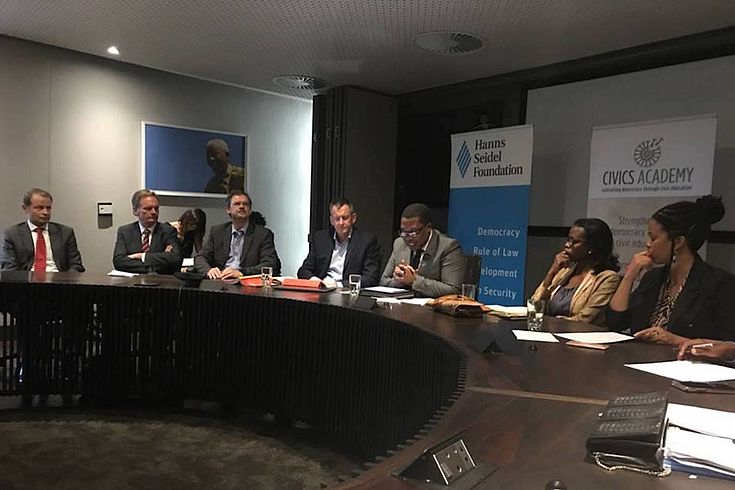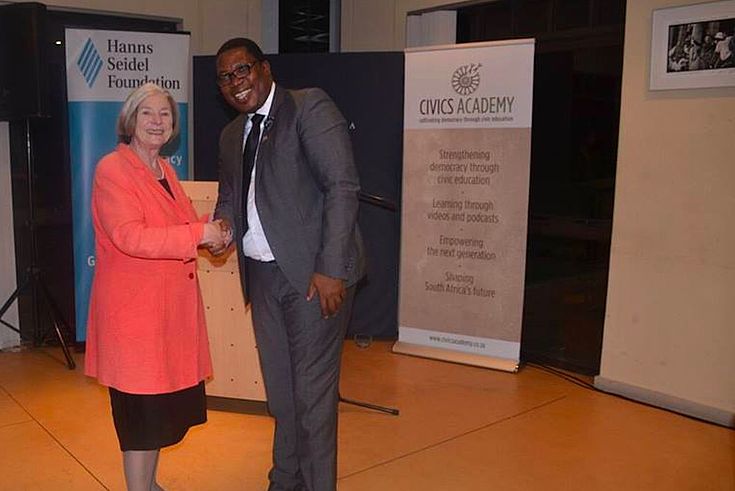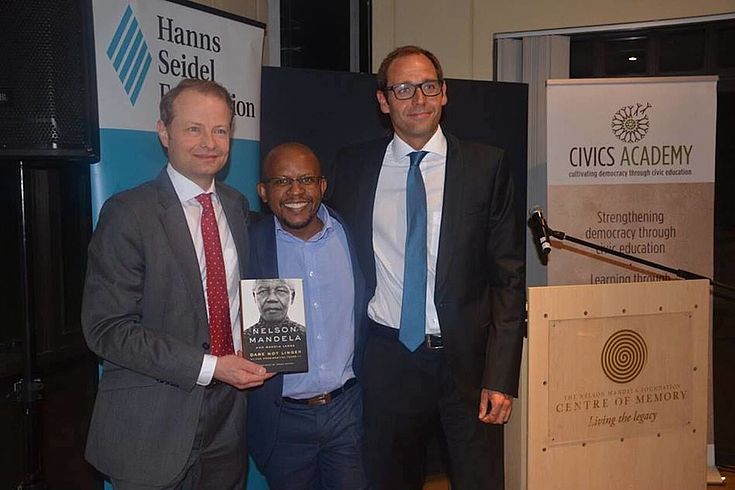South Africa at a crossroads: A roundtable discussion
"Quo Vadis South Africa – How do we move forward, together?"

Panel discussion in the boardroom of the Nelson Mandela Foundation
Nelson Mandela Foundation
Productive dialogue at a historic time
South Africa is at a crossroads. How do we address growth, employment, inequality and poverty? How do we work towards healing the divisions in our society? How do we foster cross-sector collaboration between different stakeholders, including government, business and civil society? Those were some of the questions we explored.
The speakers shared their thoughts on approaches South Africa should take in tackling these challenges with our diverse, outspoken audience which consisted of prominent representatives from civil society, think tanks, academia and business. During the event at the Board Room of the Nelson Mandela Foundation in Johannesburg, guests remarked that they were particularly happy to see many younger people in the audience, and to hear their voices in the very engaging discussion, as well as those of many women.
After the long expected forced resignation of Jacob Zuma, South Africa is in a difficult economic, social and political situation, following almost a decade of seriously sub optimal governance. While the economy is growing at less than one percent, the country experiences about 27 % official unemployment, 55 % of the population are classified as poor, and inequality is the highest in the world.

Professor Ursula Männle with Panyaza Lesufi, MEC for Education in Gauteng
Nelson Mandela Foundation
Meaningful cross-sector collaboration is needed
Participants in the debate emphasized that rampant corruption was a systemic problem, the beneficiaries of which went well beyond Jacob Zuma and his inner circle. Scores of civil servants on all levels are involved – as are a multitude of companies who have been making illegal payments to secure lucrative government contracts, amongst them multinational corporates such as KPMG, McKinsey and SAP. Accountability mechanisms failed in public service and the business sector alike; they need to be reviewed, strengthened and enforced, as economist Trudi Makhaya explained during the discussion.
Against this background, a new government with competent ministers in key portfolios must aim for a cross sector collaboration with business and civil society to achieve the inclusive, sustainable, employment intensive growth the country so urgently needs to address its significant problems – the speakers at the discussion agreed on this strategy.
To forge a really promising social compact, South Africa needs to foster honest conversations across its social divides and genuine dialogue between generations and different stakeholder groups. The country also yet has to deal with its past in deeper and more comprehensive ways and tackle inequality, both in public discourse and reality, meaningfully and productively, to build trust and avoid the dangers of growing populism.
During the discussion, Panyaza Lesufi, the MEC (Minister) for Education in Gauteng, voiced that his party, the African National Congress (ANC), owes South Africans an apology for the serious problems it has caused and allowed to persist in the country over the past few years.

Sello Hatang, CEO of the Nelson Mandela Foundation, with Dr Wolf Krug and Hanns Bühler
Nelson Mandela Foundation
Partnership of the Free State of Bavaria with Gauteng
The event took place in the presence of a delegation from the Hanns Seidel Foundation in Munich, and part of the evening was a Farewell to our outgoing Regional Director Dr. Wolf Krug and a Welcome for our new director Hanns Bühler.
During her speech at the reception following the roundtable discussion, our chairperson Prof. Ursula Männle, Minister of State (ret.), also spoke about the political situation in Germany and efforts to form a coalition government. She voiced deep concern over the success of a right wing extremist party in the elections in 2017 – the “Alternative for Germany” now occupies almost a hundred seats in the Bundestag, the German parliament. Prof. Männle emphasized that the strengthening of such radical parties, wherever it happens, calls for all democrats to unite in their stance against populist, extremist forces.
In her address, the Chairperson of the Hanns Seidel Foundation also referred to the partnership between the German state of Bavaria and Gauteng province; she had personally been involved in the initiation of this partnership as well. Prof. Männle thanked MEC Panyaza Lesufi for his engaging contributions as a speaker in the Roundtable Discussion. She expressed her hopes that the collaboration of Bavaria and the HSF with Gauteng and the Department of Education can be intensified.
